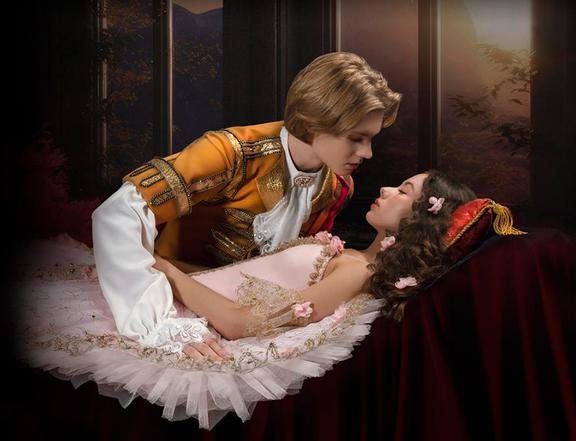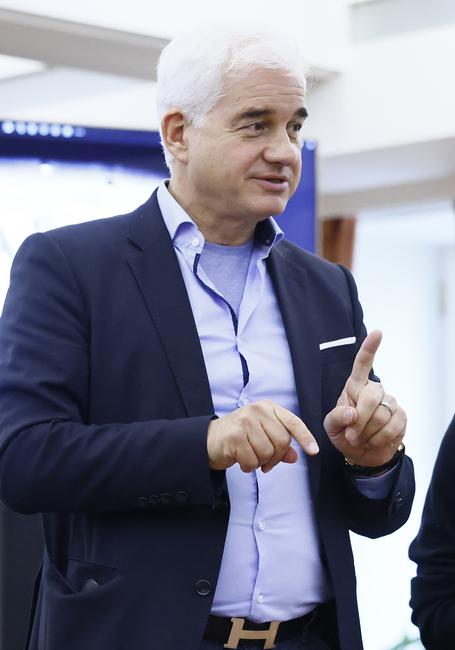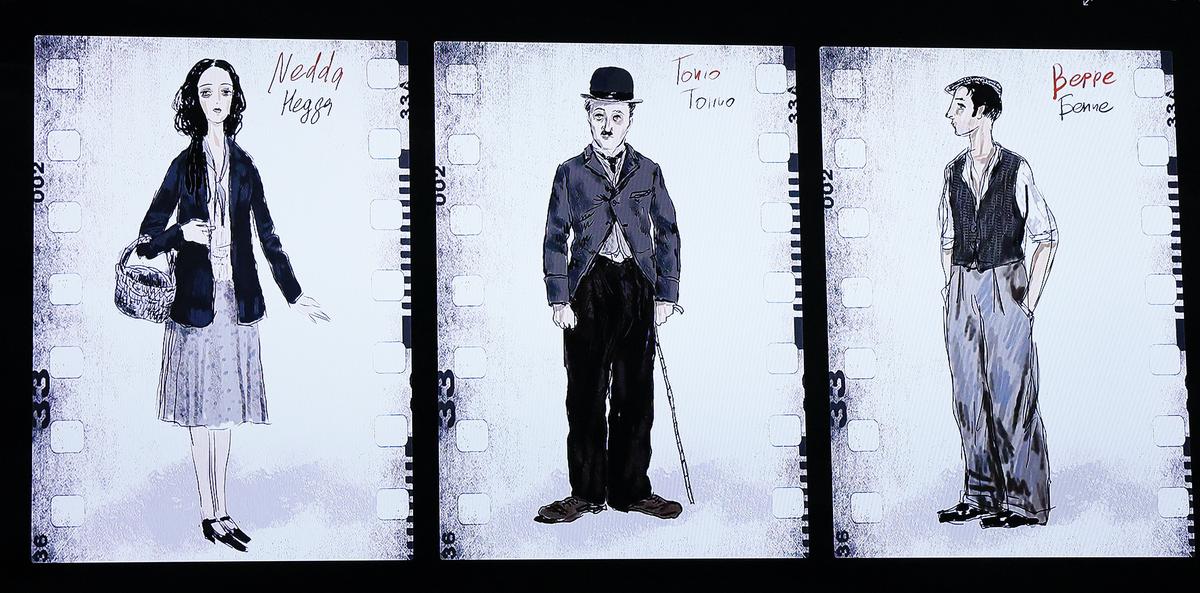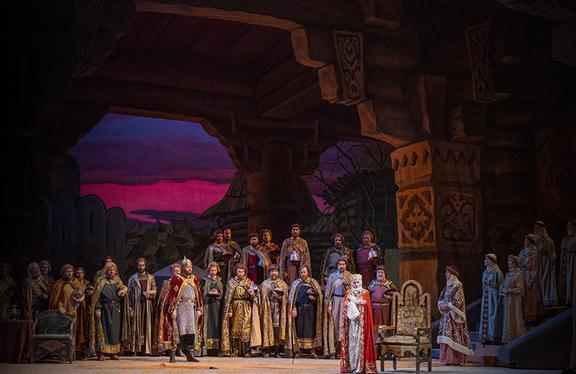The last premiere of the season will take place on the 11th of July on the Chamber Stage of the theatre and will feature a new stage version of Ruggero Leoncavallo’s opera Pagliacci.
On the eve of the upcoming premiere, we asked a few questions to the director, Hans-Joachim Frey.
— There are few verismo operas in your repertoire. Do you think a special approach is needed for their stage implementation?
— By the time the Bolshoi Theatre and I decided to take on Pagliacci, I had already staged Tosca. Like Tosca, Pagliacci was written in the era of verismo. It has no grand arias, intricate reflections, or daydreaming. It is a real drama, almost real life on stage. From the very beginning, I had a very special concept to bring it to life: transferring the action to the era of silent films. When the period of musical verismo began, the technical development of cinematography also started. It was an amazing, exciting time. Soon, the first comedy films appeared with movie stars such as Buster Keaton, Stan Laurel, Oliver Hardy, and Charlie Chaplin. So, I enthusiastically presented this verismo opera by Leoncavallo in the style of silent films.
— This opera is extremely popular, and the number of productions in Russia alone is practically incalculable. What new is there to say with another production of this opera? How can Pagliacci be in tune with today and captivate the modern audience?
— The silent film style presentation makes Pagliacci “resonant” because even today we continue to watch films made a hundred years ago and still laugh and enjoy them. So, if you have an opera about the most famous clown, moving it to the times of Charlie Chaplin and the like means demonstrating that both a hundred-year-old film and a hundred-year-old opera are still relevant. This is because the most important elements — comedy, tragedy, and reality — are intricately intertwined, almost becoming one. This is what we wanted to convey and show.
— Does the format of the Chamber Stage itself contribute to a special approach to staging? Is it convenient for you — or does it represent an additional “puzzle”?
— The process of staging a performance on the Chamber Stage is pleasantly exciting for me. I have been staging performances for many years. I worked in Bremen on an open stage by the sea, where I staged Der fliegende Holländer, which toured along the coast and was seen by ten thousand spectators. I worked at the Dresden Semperoper for an audience of three thousand inside, plus twenty thousand outside. I have staged large opera shows and gala concerts. The Chamber Stage represents the highest art, requiring a special approach to working with artists. The capacity of the Bolshoi Chamber Stage is just over two hundred people, but they watch and see every detail, and every nuance. This makes the work even more interesting, and I am very happy that I can present my fourth production and my fifth opera here: in 2011, I staged Zar und Zimmermann by A. Lortzing, in 2016 — Ariadne auf Naxos by R. Strauss, and in 2021 — one-act operas The Diary of Anna Frank. Weiße Rose (White Rose) by G. Frid and U. Zimmermann.
— Have there been any changes to the libretto or score?
— No, there have been no changes. I never touched the libretto or the musical canvas. Everything is as the composer intended, from A to Z. I only added a little pantomime and the art of acting.
— Please tell us about the performers of the main parts. How is your collaboration with them going?
— In addition to the Chamber Stage artists, the production features guest soloists — tenor Abboskhon Rakhmatullaev and soprano Eleonora Makarova, who will perform the parts of Canio and Nedda. I really enjoy working with all the participants, “bringing” them to the style of the performance. We play as if we are creating a silent film. And this game takes place on different levels: the reality of the rehearsal, the reality of the film’s creation, the reality of ordinary people and the reality of the opera’s characters — Silvio, Peppe, Nedda, Canio and Tonio.
— Could you describe the main idea of your performance in one or two phrases?
— I can say with confidence that this will be a wonderful and exciting evening, centred around a simple truth: life is a joke, and we will all laugh once again. After all, laughter is the most important thing in the world.
Tour into history
Leoncavallo went down in music history as one of the greatest representatives of verismo, a movement in Italian literature and art from the last quarter of the 19th to the first quarter of the 20th centuries. Inspired by the great success of Pietro Mascagni’s opera Cavalleria rusticana, staged in 1890 at the Teatro Costanzi (Roma Opera), the composer began working on an opus that was close to it in spirit and theme: the opera Pagliacci.
It was completed in 1892 and first staged in May of the same year at the Milan Teatro Dal Verme. At the world premiere, Arturo Toscanini himself was at the conductor’s stand, and the leading roles were performed by outstanding singers of their time, representing the Italian and French schools: Adelina Stehle (Nedda), Fiorello Giraud (Canio), Francesco Daddi (Peppe), Mario Ancona (Silvio), and Victor Maurel (Tonio). (Thanks to the latter, the opera received the name under which it is still performed; initially it was called Il pagliaccio, but after Morel was indignant that his hero was “thrown overboard”, the work was renamed Pagliacci.)
In the Russian Empire, there were two premieres: one in Russian and one in Italian. The Russian version of Pagliacci, translated by Nikolai Spassky, was first heard in Moscow in January 1893. The production featured artists from the first national opera partnership, founded by the singer and teacher Ippolit Pryanishnikov, who personally performed the part of Tonio in the Russian premiere. Sharing the stage with Pryanishnikov were soloists from the Imperial Bolshoi Theatre: Pavel Koshetz (Canio), Alma Foström (Nedda), and Georgy Verger (Silvio). The conductor was Iosif Pribik. In the original language, the opera was first performed in Moscow again a year later, in January 1894, by artists from a theatrical impresario Ivan Zazulin’s troupe.
At the Bolshoi Theatre, Pagliacci has its own glorious history: five productions, more than a hundred performances. The first performance took place in November 1893, the opera was sung in Spassky’s translation. The production team included legendary people: Ippolit Al'tani (Music Director), Anton Bartsal (Stage Director) and Karl Waltz (Set Designer).
Subsequent productions were staged during the Soviet era. In November 1923, the opera was produced by Mechislav Domashevich (Music Director), Vladimir Knipper-Nardov (Stage Director), and Mikhail Sapegin (Set Designer), and in March 1957, by Vasily Nebolsin, Yuri Petrov, and Yuri Pimenov. In April 1982, a concert performance in Italian was conducted by Algis Žiūraitis, and in July 1985, the theatre released Pagliacci in its own version in Russian, translated by Pryanishnikov and Y. Dimitrin (Music Director — Algis Žiūraitis, Stage Director — Semyon Stein, Set Designer — William Klementyev).
After a break of more than forty years, the “manifesto” of verismo returns to the Bolshoi Theatre. Having endured a huge number of successful productions around the world, Pagliacci has become that timeless opera, the plot and musical language of which remain attractive to today’s audiences. Leoncavallo himself wrote the libretto, based on a story that happened and was well known to his family. According to the composer’s memoirs, his father, who was a judge, tried a similar case. The realism of life’s “scenery” emphasised by the expressiveness of emotions in a person driven to extremes — whether tears of joy or grief, nervous-hysterical laughter, or happy-carefree moments — along with the accessibility and universality of the musical accompaniment (without any loss of complexity), became the defining features of verismo opera, ensuring its demand among Russian and foreign theatres.
You can meet the production team here.
The premiere series of the performances will be held on the 11th to the 14th of July on the Chamber Stage of the Bolshoi Theatre.
* In Italian Vesti la giubba! (literally Put on a costume — words from the famous aria of Canio).
The Chamber Stage of the Bolshoi Theatre presents its third premiere of the season — a major revival of the production The Fables of the Vixen, the Duckling and Balda to music by I. Stravinsky, S. Prokofiev and A. Pravednikov, the first performance of which took place at the Beethoven Hall in October 2015.

After a four-year break, The Sleeping Beauty will once again grace the stage of the Bolshoi. This return, which will mark the opening of the new theatre season, promises to become one of its most grandiose events. The premiere will take place on the Historic Stage on the 7th of September. It will be broadcast to the Bolshoi’s home address — Theatre Square, as well as Khokhlovskaya, Trubnaya, Bolotnaya Squares and the capital’s Pushkin public garden, at the Moscow cinema Oktyabr, and in more than a hundred cinemas across the country and on the theatre’s official account on the VKontakte social network.


